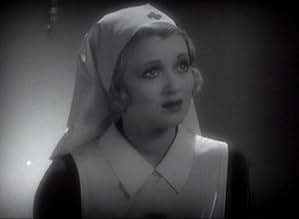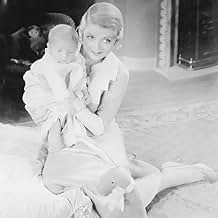A war officer who is thought dead returns to the woman he loves, only to find that she has remarried.A war officer who is thought dead returns to the woman he loves, only to find that she has remarried.A war officer who is thought dead returns to the woman he loves, only to find that she has remarried.
- Awards
- 1 win total
Daisy Belmore
- Tibbetts - Nurse
- (uncredited)
Billy Bevan
- Departing British Soldier
- (uncredited)
Edmund Breon
- Tom Kent
- (uncredited)
Eddy Chandler
- Captain Peters
- (uncredited)
Jay Eaton
- Dancing Doughboy
- (uncredited)
Bill Elliott
- Dancing Doughboy
- (uncredited)
Fred Esmelton
- Ponsonby's Butler
- (uncredited)
Mary Forbes
- The Duchess
- (uncredited)
Elizabeth Forrester
- Evelyn Kent
- (uncredited)
Robert Greig
- Hansom Cabby
- (uncredited)
Olaf Hytten
- Aide to Major General
- (uncredited)
Claude King
- Major General Visiting Hospital
- (uncredited)
Featured reviews
I saw the last part of this on TCM; it was Joel McCrea day.
It didn't really fit -- this is Constance Bennett's movie, 100%, and that's the problem. This has to be one of the worst performances of her career. Even making allowances for 1931, she is very histrionic and melodramatic, in all the worst, most silent-movie-cliché ways.
Technically, Paul L. Stein's direction is fine (for 1931), but it appears from this he was not an "actor's director". Oddly, Ms. Bennett's next film, "The Common Law," re-teamed her with director Stein and costar McCrea. It is better; not memorable, but at least she isn't painfully bad in this one.
It didn't really fit -- this is Constance Bennett's movie, 100%, and that's the problem. This has to be one of the worst performances of her career. Even making allowances for 1931, she is very histrionic and melodramatic, in all the worst, most silent-movie-cliché ways.
Technically, Paul L. Stein's direction is fine (for 1931), but it appears from this he was not an "actor's director". Oddly, Ms. Bennett's next film, "The Common Law," re-teamed her with director Stein and costar McCrea. It is better; not memorable, but at least she isn't painfully bad in this one.
In BORN TO LOVE, Constance Bennett (Doris) and Joel McRea (Barry) are lovers who meet during the last weeks of the First World War. London is portrayed as a city in imminent danger of bombs from aircraft. They meet and predictably fall in love despite the chaos and confusion that surround them. There is an interesting scene in which they make love, one that is prudishly suggested off screen, yet one that in just a few years would have been banned by Hollywood as overtly salacious. The plot is the contrived package of Barry's reported death, forcing Doris to marry another. The second half of the film is less melodramatic and more of an acerbic commentary on the harshness of an English divorce system that allows a rich and titled husband to retain custody of a child over the wishes of a impecunious mother. There is an encoded ideology in the film that does not hide the fact that poor women who marry titled men can expect no mercy or kindness from a patriarchal legal system. BORN TO LOVE nevertheless carries the audience to a satisfying if not predictable conclusion of the need for true love to triumph over formidable societal obstacles.
It is WWI. Brooklyn gal Doris Kendall (Constance Bennett) meets American flyer Captain Barry Craig (Joel McCrea) during a Zeppelin attack in London. She is later told that he has been shot down and presumed dead. Her friend Sir Wilfred Drake (Paul Cavanagh) proposes marriage. She tells him that she's pregnant with Barry's baby. He marries her anyways. It turns out that Barry is still alive.
This is a rather boring story for the first hour. It's a lot of things that keep it that way. The movie makes a dramatic turn at around the hour mark. It needed the villainous turn to raise the intensity. By then, most of the audience has probably lost interest. Then it takes a dark turn that feels undeserved. I don't really understand Wilfred at that moment.
This is a rather boring story for the first hour. It's a lot of things that keep it that way. The movie makes a dramatic turn at around the hour mark. It needed the villainous turn to raise the intensity. By then, most of the audience has probably lost interest. Then it takes a dark turn that feels undeserved. I don't really understand Wilfred at that moment.
I really love Constance Bennett and Joel McCrea and their underrated talent and range, but this film was just one emotional blow after another to Bennett's character, Doris Kendall, a nurse in Great Britain during World War I, to the point where it got hard to continue watching. The film starts out on a rather fascinating note - Doris is practically hypnotized by the sight of a German dirigible in a rather strange "dogfight" with British planes over London. Down goes the dirigible in a pile of flames.
Joel McCrea's character, Captain Barry Craig, pulls Doris out of danger and sparks begin to fly. At the same time, Doris is nursing an English nobleman (Paul Cavanagh as Sir Wilfred Drake) back to health from his war wounds and he has fallen in love with her. Captain Craig and Doris throw convention to the wind and spend one night together and consummate their relationship before he has to ship out to France. Then one tragedy after another ensues, some due to misunderstandings, some due to natural occurrences, and some due to divorce law in England as it stood in the early twentieth century in which one of the parties had to be the bad guy in order for divorce to occur with legally punitive measures taken against the party that is deemed to be "at fault".
This movie may costar McCrea, but this is really Constance Bennett's film all the way. Frederick Kerr is particularly noteworthy as an older member of England's upper class that has a crusty exterior that hides a gooey center - he's quite sympathetic and kind to Doris. Louise Closser Hale plays his wife who also has a crusty exterior but has a heart of - well - crust. In spite of these differences in viewpoint these two older members of the cast play off one another quite well.
Recommended, but not if you're looking to be cheered up.
Joel McCrea's character, Captain Barry Craig, pulls Doris out of danger and sparks begin to fly. At the same time, Doris is nursing an English nobleman (Paul Cavanagh as Sir Wilfred Drake) back to health from his war wounds and he has fallen in love with her. Captain Craig and Doris throw convention to the wind and spend one night together and consummate their relationship before he has to ship out to France. Then one tragedy after another ensues, some due to misunderstandings, some due to natural occurrences, and some due to divorce law in England as it stood in the early twentieth century in which one of the parties had to be the bad guy in order for divorce to occur with legally punitive measures taken against the party that is deemed to be "at fault".
This movie may costar McCrea, but this is really Constance Bennett's film all the way. Frederick Kerr is particularly noteworthy as an older member of England's upper class that has a crusty exterior that hides a gooey center - he's quite sympathetic and kind to Doris. Louise Closser Hale plays his wife who also has a crusty exterior but has a heart of - well - crust. In spite of these differences in viewpoint these two older members of the cast play off one another quite well.
Recommended, but not if you're looking to be cheered up.
Constant Bennett is a beautiful Red Cross nurse and Joel McCrea her lover in "Born to Love." The story held my interest but it is truly a turgid melodrama with some very old-fashioned, over the top acting from Bennett.
Bennett and McCrea meet during World War I in London, fall in love, have sex; he leaves for battle and is later presumed dead. Pregnant, she marries Paul Cavanagh, Sir Wilfred Drake, who comes off like a nice guy at first.
When McCrea turns up again, Bennett is determined to be loyal to her husband. But when he realizes she's seen McCrea and is still in love with him, the jig is up. In the divorce, Sir Wilfred gets full custody of the child.
And here's where the going gets rough for the viewer, not to mention the characters! McCrea is adorable; Cavanagh is the type of leading man one doesn't see anymore. He comes off as very unattractive in this, though in his 32-year career, this often wasn't the case.
As for Bennett, one has seen her to much better advantage. This is one of those creaky movies that's interesting from a precode and artifact point of view, but you can see these two stars in better films.
Bennett and McCrea meet during World War I in London, fall in love, have sex; he leaves for battle and is later presumed dead. Pregnant, she marries Paul Cavanagh, Sir Wilfred Drake, who comes off like a nice guy at first.
When McCrea turns up again, Bennett is determined to be loyal to her husband. But when he realizes she's seen McCrea and is still in love with him, the jig is up. In the divorce, Sir Wilfred gets full custody of the child.
And here's where the going gets rough for the viewer, not to mention the characters! McCrea is adorable; Cavanagh is the type of leading man one doesn't see anymore. He comes off as very unattractive in this, though in his 32-year career, this often wasn't the case.
As for Bennett, one has seen her to much better advantage. This is one of those creaky movies that's interesting from a precode and artifact point of view, but you can see these two stars in better films.
Did you know
- TriviaThe first of four films co-starring Constance Bennett with Joel McCrea, the other three being The Common Law (1931), Rockabye (1932), and La revanche du coeur (1933).
- GoofsIn an early sequence set in 1918, Constance Bennett is shown playing a phonograph record on the Victor label--but the label is the "scroll design" Victor didn't use until 1925.
- Crazy creditsDebut of actress Eily Malyon.
Details
Box office
- Budget
- $338,000 (estimated)
- Runtime
- 1h 21m(81 min)
- Color
Contribute to this page
Suggest an edit or add missing content





































